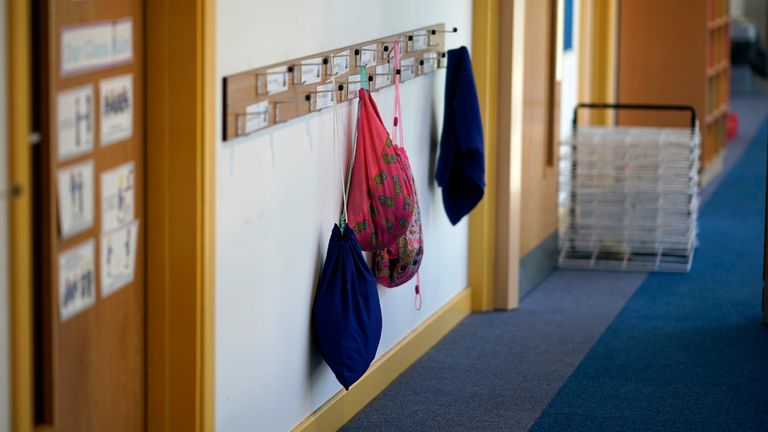COVID-19: Nine in 10 vulnerable children missed school during lockdown, Lords report says
Peers said vulnerable children "face more risk of abuse and dropping further behind due to COVID-19聽school closures".
Friday 13 November 2020 02:27, UK
Nine in 10 vulnerable children missed school during the first coronavirus lockdown, a new report says.
The report from the House of Lords Public Services Committee notes that coronavirus restrictions have hit children, disabled people and BAME communities hardest.
Peers say that children who are classed as disadvantaged and vulnerable "face more risk of abuse and dropping further behind due to COVID-19 school closures".
Schools were open to some children during the first lockdown, offering support for vulnerable children and children of key workers.
Peers also noted that there were fewer home visits by social workers, adding there was "not enough support for prevention and early intervention services".
The report also said that "fundamental weaknesses" need to be looked at, however, to ensure services can withstand crises in the future.
Baroness Armstrong of Hill Top, chairwoman of the committee, said: "Government, local authorities and other public service providers are not working together effectively to protect vulnerable children.
"Before COVID-19 many vulnerable children couldn't get the public services they needed. With most unable to attend school because of the lockdown they had little support and many more have become invisible after losing contact with public services during the pandemic."
Peers are asking ministers to draw-up an action plan for vulnerable children.
The committee also heard that "many deaths from COVID-19 could have been avoided if preventative public health services had been better funded".
The committee noted: "Death rates were highest in the most deprived communities where avoidable health conditions made people more vulnerable.
"Poor health is particularly prevalent among black and ethnic minority people living in poverty - almost one third of all hospital patients critically ill with Covid-19 were from BAME backgrounds despite making up just 13% of the UK population".
:: Subscribe to the Daily podcast on , , ,
Baroness Armstrong said: "There should be no return to the pre-COVID-19 status quo.
"The fight against health inequality should be a priority for the government. Black, Asian and minority ethnic people suffered disproportionately due to health inequalities and unequal access to services.
"The government's own pandemic planning identified that social care would need significant support during the outbreak of a disease like COVID-19, yet social care was the poor relation to the NHS when it came to funding during lockdown.
"Discharging people from hospital into care settings without testing and with inadequate PPE led to the tragic loss of thousands of older and disabled people."





